
 |
|||
| |
|||
 Jason Moore works with cast members on an episode of the WB's Everwood. Fellow alumnus Greg Berlanti is creator, writer and executive producer for the show. © 2003 Warner Bros. Entertainment Inc.  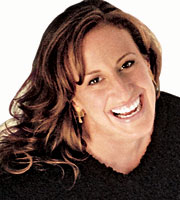  Sex and the City executive producer Cindy Chupack, a veteran of Coach and Everybody Loves Raymond, bolted network TV for HBO. She has a deal with the cable network for a new show after Sex and the City ends its successful six-year run later this year. Chupack photo: Susan Maljan; Sex and the City photo: Craig Blankenhorn/HBO 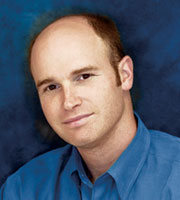  David Hollander, executive producer of The Guardian, writes nearly every episode and oversees casting and production. Credit: Hollander and The Guardian photos © 2001, 2003 CBS Broadcasting Inc. All rights reserved. 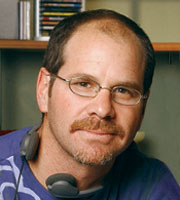  Richard Lewis has spent four years as producing director of CSI: Crime Scene Investigation, where he works with fellow alumna Marg Helgenberger (C82), at left in CSI photo. Lewis and CSI photos © 2003 CBS Broadcasting Inc. All rights reserved. 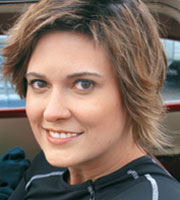  As an assistant to executive producers on Fox's counter-terrorism drama 24, Anne Cofell does research, writes dialogue and regularly calls the White House. TM & (c) FOX and its related entities. All rights reserved. 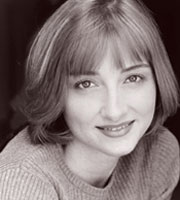 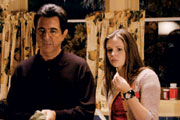 Joy Gregory, a founder of the Lookingglass Theatre, is a writer and executive story editor on the CBS drama Joan of Arcadia. ©2003 CBS Worldwide Inc. All rights reserved. 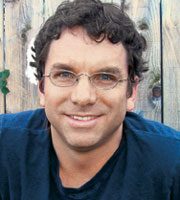 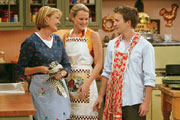 Comedy writer Perry Rein worked as Al Pacino's driver when he first landed in Los Angeles. He is now consulting producer for ABC's Married to the Kellys. © 2003 ABC Inc. |

Weaving through a maze of wires and lights, Richard Lewis (C83) quickly makes his way past the autopsy room, the morgue, the evidence and ballistics labs filled with beakers and bullets to a tiny cart with two TV monitors, where he plants himself in a director's chair carrying the CSI logo. "Jorja, reach into that tube. The clump is a little deeper in," he instructs actor Jorja Fox, preparing for a crime lab scene. Seconds later, a shrill bell rings. "Quiet, please," shouts the assistant director. "Roll sound." "And action," bellows Lewis, who gets the shot he wants and bounds out of his seat. "Let's cut it, print it. Let's turn it around." As producing director of the hit CBS drama CSI: Crime Scene Investigation for the past four years, Lewis is among an elite cadre of Northwestern graduates toiling behind the scenes in prime-time entertainment television. So many purple-wearing alumni work in Hollywood as TV writers, directors and producers on comedies and dramas that Lewis likens it to a sci-fi film: "It's a Northwestern alien invasion." Many have created their own TV series and serve in the top job as executive producers, both writing and running the shows: Greg Berlanti (C94) of the WB drama Everwood, David Hollander (C90) of the CBS drama The Guardian, Robert Borden (C89) of ABC's sitcom George Lopez, Betsy Thomas (C90) of the WB comedy Run of the House, Terri Minsky (J80) of the Disney Channel's Lizzie McGuire and Mara Brock Akil (J92) of UPN's comedy Girlfriends, among others. Just as many are struggling to break in or working their way up the ladder during one of the most tumultuous eras of the television business. The past decade has seen the arrival of two new broadcast networks: UPN and the WB, as well as an explosion of cable channels, all of which generate more work for creative types. At the same time, it's been an era of corporate consolidation, network-studio mergers, the disappearance of independent production companies, belt-tightening and audience fragmentation. All of these have enormous implications, including less money for many working in the industry. Meanwhile, the popularity and critical acclaim of violent and sexy shows like The Sopranos and Sex and the City (where Northwestern's Cindy Chupack [J87] is executive producer) on HBO, which has fewer restrictions than broadcast television, also has pushed the content envelope further than ever before. "Times have changed, and therefore TV has changed," says Lee Phillip Bell (WCAS50), who has worked in television since the 1950s, creating two daytime dramas, The Young and the Restless and The Bold and the Beautiful. "The competition is very fierce. The language is not as kind as it used to be. [When I started], we never had bedrooms, and nothing could be construed as sensual." And of course, everyone is contending with the massive popularity of reality TV, which feeds viewers a steady dose of humiliation, fear and rejection, while taking jobs and airtime away from writers. Especially hard hit have been sitcom writers, who are struggling to create new hits to replace favorites of the '90s like Seinfeld and Friends. "I don't like anything on TV now," says veteran comedy writer Eric Gilliland (C84), who ran ABC's Roseanne as executive producer for four years and shot a politically controversial pilot for Fox last year that didn't get ordered. Gilliland has given up on network TV and just wrote a dark comedy pilot about a foster family for HBO instead. "HBO doesn't need to go for the easy laugh or the easy story." Because HBO and other premium cable networks like Showtime make their money from subscribers, they air no commercials and are not beholden to ratings, which determine ad rates. In broadcast television, ratings govern survival, and most networks chase the same demographics that advertisers pay the most money to reach: adults between 18 and 49, the younger the better. Scripts also are sculpted around artificial act breaks designed to lure viewers back after commercials. This tension between art and commerce has always existed in television, to be sure. But as the networks were swallowed up by giant media conglomerates such as Viacom (UPN and CBS) and Disney (ABC) over the past decade, entertainment presidents increasingly became number crunchers with less autonomy and patience for shows that don't perform right out of the gate. "Cheers in its first season was the lowest-rated show [for much] of the year," Gilliland recalls. "[NBC's then-chairman and CEO] Grant Tinker said, 'I like this,' and he let it stick around. One guy had a strong point of view. No one goes by their gut anymore. It's all testing, and they hit on the same formula. These guys all went to Harvard Business School." Chupack also spent years writing for network television before landing at HBO. Her first television job was a "really silly show" about a talking baby called Baby Talk. She had incrementally better experiences on Coach and Everybody Loves Raymond, which was "such a network darling [at CBS], we were left alone." But after getting a taste of HBO, her view of network TV dimmed, especially when she returned to create her own show for ABC, a vehicle for Gabriel Byrne called Madigan Men, to fulfill the obligations of a deal she made before joining Sex and the City. Chupack wound up battling the network over creative issues, and ultimately her original vision was lost amidst a kitchen full of network cooks, and the series went down after 13 episodes. "The decisions at the network seemed fear-based," Chupack says. "There was so much money at stake, and the more money spent, the more pressure. Those ratings the morning after were hugely important and affected everyone's mood." Network TV comedies "are going through growing pains," she says. "There are too many writers willing to compromise because they are happy just to be working in TV. It's more about money than being creative. The reality is there are so many fewer slots and not a lot of room to let a show develop and find itself." But television is cyclical, and whenever one group is hurting, another thrives. New comedy hits might be hard to find, but as Hollywood studios cut back on the number of feature films made, many A-list directors and producers have moved to television, making this a golden era for television dramas. "It used to be just talking heads," says Jason Moore (C83), who has directed Broadway plays, such as Avenue Q, and episodes of television shows Dawson's Creek, One Tree Hill and Everwood. "Now it's more of a visual art." Shows like ER and The Sopranos raised the visual bar, and now CSI, a "director-driven show," executive produced by filmmaker Jerry Bruckheimer (Top Gun), has taken it to another level because "audiences are demanding a more filmic approach," says CSI 's Lewis says. "We do wild things - we go into bodies, we have ghost images. We try to go through the mind of the character right into the crime. Audiences want to have that visceral experience to displace their own experience." In part because of these visual advancements, Lewis says "there's some argument to say there's a higher quality in TV drama than in feature films." But compared with film, the pace of television is relentless. "You don't have time to figure things out," Moore says. "You don't do a second and third take if you can help it. If you're not done in time, it's money." So no matter the obstacles, television is all about getting it done. When Moore shot a prom episode of Dawson's Creek on a North Carolina boat one February, "it was freezing," he says. "There were four kids in parkas. We'd roll, and they would all throw them off and stand there in spaghetti strap dresses. The actors would suck on ice so we wouldn't see their breath when they'd speak." And while directors typically run feature films, television is and always has been a writer's medium. Most TV directors have little control over the final cut of a series because the executive producer in charge of nearly every show is a writer, whose main job is to continually feed the hungry beast that is television. The pressure never stops. After all, without stories to keep viewers interested in coming back week after week, TV shows rapidly fail. Joy Gregory (C88), a writer and executive story editor on the CBS drama Joan of Arcadia, believes dramatic storytelling has improved as much as visual art in one-hour dramas. "I think with the sweeter, more tone-y WB shows, a corner was turned," she says. "Production values are more cinematic, and people are trusting smaller stories using characters." That's good news to someone like The Guardian's Hollander, who grew up in a family that disdained television and was never interested in the medium until he created his own show, the CBS drama The Guardian. Working first in theater, Hollander wrote a stage play that spoofed Hollywood, which caught the attention of film producer Scott Rudin. Hollander went into the movie business as a screenwriter. But the experience left him demoralized after he spent six years taking a back seat to directors, actors, producers and studio executives, who, he says, view writers as "interchangeable parts." "It's not a lot of fun if you have a personality like mine," he says. "It's isolating and powerless. I felt I was wasting my valuable time." Writing for theater wouldn't support his family of three kids, but percolating in the back of Hollander's head was the idea for a character-driven, television legal drama set in his hometown, Pittsburgh. Ignoring protocol, he skipped the studio pitch, heading straight for the networks with a list of conditions - a bold gamble for a television novice. "I guess they thought, what the hell," Hollander says. "They signed off on creative control." CBS gave him a relatively paltry sum to produce a pilot, which he shot in Toronto, flying below the radar screen of network executives. The series prototype tested well among a focus group of people who match the demographics of CBS viewers. Immediately, The Guardian became a sleeper hit, giving Hollander even more leverage to take risks without network interference. He writes nearly every episode and oversees casting and production. "That (ratings) number matters enormously. TV is a numbers business," Hollander says. "My main character does all the things a main character does not typically do on CBS. He has a coke habit. He doesn't like kids. He has sex with other women while his pregnant girlfriend is at home." Hollander actually credits audience fragmentation and smaller ratings (compared to the years before 100 channels) with giving writers more freedom to make unpopular choices. "You do not have to entertain 30 million people," Hollander says. "You set your demo and get your ad rate." Few people break into the business as quickly and at as high a level as Hollander, and for those struggling to make it, television isn't the picture of Hollywood glamour. In fact, nearly everyone starts at the bottom, in the mailroom of an agency or as a production or writer's assistant. Anne Cofell (WCAS95) was teaching playwriting at Ohio University before she moved to Los Angeles in 2000 for a short-term gig as a production assistant, "working 18-hour days baby-sitting kids about to go on stage." Next, she got a production assistant job on the improv show Whose Line Is It Anyway? where she submitted 40 skit ideas a day. "I didn't know if anyone was reading them, so I started making them really dirty," she says. "Then when I stopped, the executive producer said, 'What happened to them?'" She finally started getting ideas on the air, which "gave me hope." But she still had dues to pay, first as an assistant at the talent agency the Creative Artists Agency and then as an assistant to various executive producers on the Fox drama 24, where she has been since the show's inception. After three years she recently landed an agent and is poised to get her first break as a writer. But in the meantime her job has been an eclectic mix of research, technical dialogue writing, publicity and administrative work, such as answering phones in the bullpen, down the hall from the stage where the show is shot. "Some of the most fun is researching torture techniques," Cofell says. "All I know is I would break like a twig." Because 24 is about a government counter-terrorist unit, Cofell calls the White House regularly and has intimate knowledge of biowarfare and nuclear weapons. "Today I interviewed the head of the communicable disease program for [Los Angeles] County," she says. "When I first started, I cold-called the CIA and FBI, and they gave me information. I'm on every list, I'm sure of it." Sometimes she learns a little too much for comfort. Last season, her boss told her, "I need dialogue on how to defuse a nuke, right away," Cofell recalls. "I got a guy from the bomb squad to help, but he kept getting called away on emergencies, which made me really nervous." While the job has its perks - free food all day long and haircuts by the show's stylist for a six-pack of beer - the work is all-consuming. When she's not in the office, she's writing on her own spec scripts, sample episodes of various shows used to demonstrate her writing. "Be prepared to focus 100 percent on your career for at least two years," she says to those who want to write for television. "I mean 18-hour days, 100 percent. It's incredibly competitive. There were times I almost stopped and said, 'I can be a playwright and make no money.' There were times when I almost went to lunch and didn't come back because I felt like it wasn't worth it." But the eventual payday tends to make people stick it out. TV writing jobs range from a starting salary of $2,900 a week for 40 weeks ($116,000 a year) to $50,000 per episode for usually 22 episodes ($1.1 million per year). Freelance TV directors also make $30,000 to $40,000 per episode, which can mean a week of work for sitcoms and a month for dramas. Creators of shows also get back-end profits after a series shows some success. (It may be surprising, but those numbers pale next to the money that flowed to TV writers - especially comedy writers - a few years ago, when nearly anyone who had ever worked on Seinfeld got a multimillion dollar overall deal to develop their own shows, most of which never saw the light of day. Those overall deals have dried up, and rewards are now more closely tied to performance.) For comedy writer Perry Rein, a consulting producer on ABC's Married to the Kellys, the 4 1/2 years of grunt work when he first arrived in Hollywood provided him with enough comedic fodder to get his foot in the door. Rein spent his first three years in Los Angeles working as Al Pacino's driver. "He'd sit in the front seat with me, and we would chat, usually about our girlfriends," he recalls. "He'd be really interested in my life, and he'd give me advice." Pacino's assistant eventually got Rein a job as a production assistant on a sitcom, but Rein was fired two months later - on his birthday - because a producer wanted to hire his nephew for the job. Rein wound up working in "this hellhole" of a mailroom at New Line Cinema, where "I had this crazy boss," he says. "I'd see her and duck out of the way." Fortunately, he found his writing partner, Gigi McCreery, during that dark period, and she had worked as Harrison Ford's nanny. The combination of Al Pacino's driver and Harrison Ford's nanny made them an easy sell. "We lived off that," Rein says. Within a few years, they went from Hangin' with Mr. Cooper to Friends, the top-rated sitcom, where he stayed for two seasons, working in a writer's room with luxurious leather seats. One of his more memorable scripts, an episode in which the character Joey pretended to own a Porsche, came from Rein's own experience. Rein borrowed his friend's convertible BMW for a date, and the woman "was so taken by it - 'Omigod, this is so Hollywood' - I couldn't bring myself to tell her," he says. "I ended up liking her, so the next weekend I didn't know what to do." Chupack also draws on life experience for Sex and the City, which has its hazards. "When I do manage to find time to go on a date, it's all work," she says. "It seems like it's almost something we shouldn't bring up too quickly with a man. It scares them." Chupack and Rein are both developing their own series next, and while very few new shows make it, Rein doesn't let the transient nature of the work get to him. "You have to learn to enjoy the hiatus," he says. "You can't worry about it. You've got to keep writing new material." Nor does Rein buy into the idea that sitcoms are a dying form, although he does think networks should take more chances. "They keep trying similar versions of the things that worked because it's too much of a risk to try something really new," Rein says. And network-studio mergers have only made the situation worse. "You end up dealing with the same sets of people more often," he says. "It's not healthy. It's incest." Given the growing popularity of reality TV, leaving fewer timeslots for scripted television, most writers and directors are remarkably optimistic about the future. "There's always going to be reality. Trends come and go, but there's a fundamental human need for storytelling," Gregory says. It's that kind of sunny outlook that keeps the machine running when times are tough. Back on the set of CSI, Lewis crouches down next to a black Mercedes, blocking out his next scene. "Then we close the doors," he says. "We cut through as the smoke fills. Here comes the smoke, here comes the smoke. We fill with smoke. We do Cheech and Chong. We see the swirls. We see the only place there's no swirls is over the driver's seat.. OK, let's light this puppy." "I don't think we can do it," his assistant director says. "I know we can," Lewis retorts. "I have a production designer telling me it's not going to look real," she says. "It just doesn't matter," Lewis assures her. "I promise you." And with that, he gets it done, and it's a wrap. Jenny Hontz (J93), a Los Angeles-based freelance writer, formerly worked as the TV editor of Variety and as vice president of creative affairs at Touchstone TV. Did you enjoy this story? If you have any comments or questions, send them to letters@northwestern.edu. |